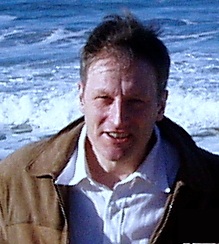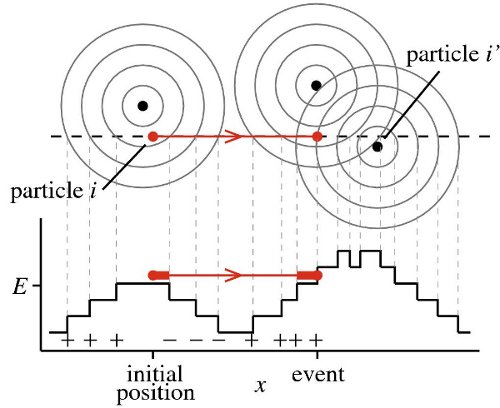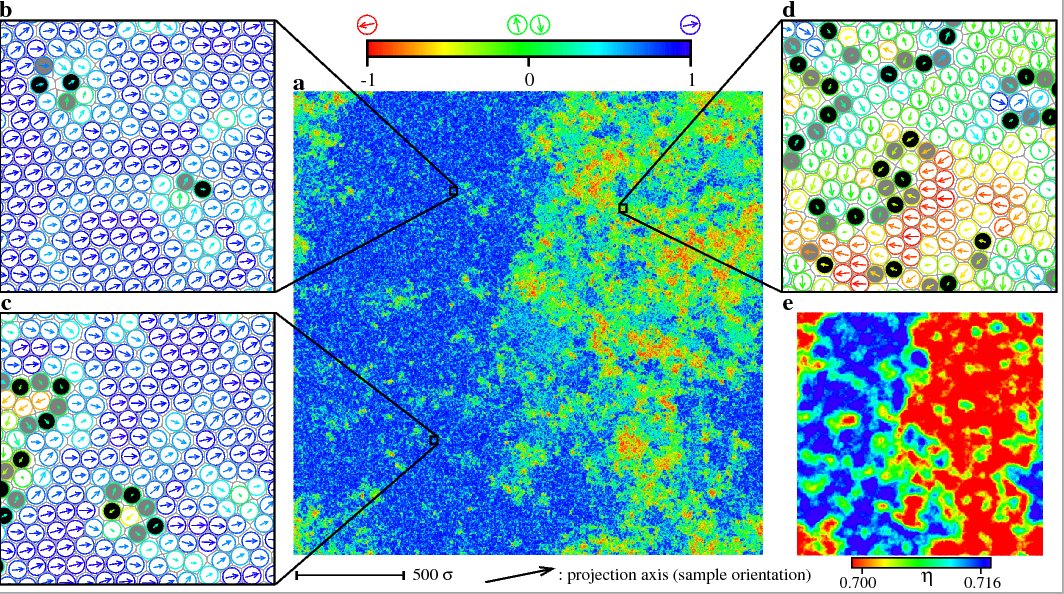Main Page
From Werner KRAUTH
| Revision as of 04:59, 28 August 2012 Werner (Talk | contribs) (→Event-driven Monte Carlo algorithm for general potentials) ← Previous diff |
Revision as of 05:00, 28 August 2012 Werner (Talk | contribs) (→Event-driven Monte Carlo algorithm for general potentials) Next diff → |
||
| Line 24: | Line 24: | ||
| In recent works, as for example on the [[Bernard_Krauth_2011|melting transition in two dimensions]], the [[Bernard_Krauth_Wilson_2009|event-chain algorithm]] has proven quite helpful. This hard-sphere Monte Carlo method runs a lot faster than earlier methods although the speed-uo remains constant for large system sizes. Nevertheless, gaining a factor of about 100 is not so bad for run-times (with the new algorithm) on the order of a few months... we got our results before it was time to retire. | In recent works, as for example on the [[Bernard_Krauth_2011|melting transition in two dimensions]], the [[Bernard_Krauth_Wilson_2009|event-chain algorithm]] has proven quite helpful. This hard-sphere Monte Carlo method runs a lot faster than earlier methods although the speed-uo remains constant for large system sizes. Nevertheless, gaining a factor of about 100 is not so bad for run-times (with the new algorithm) on the order of a few months... we got our results before it was time to retire. | ||
| - | [[Image:Event stepped move.jpg|left|100px|border|thumb|Move of one particle in the Event-driven MC algorithm]] Recently, Etienne Bernard (now at MIT) and I were able to [[Bernard_Krauth_2012| extend the event-chain algorithm]] to continuous potentials, and we are now quite excited: The algorithm allows to break detailed balance, it is (hopefully) much faster than local Monte Carlo algorithms, and it is extremely easy to program, to parallelize (hopefully), to modify and, why not, to improve. Technically, we work with stepped potentials (see the figure, similar approaches exist for molecular dynamics), but there is no problem going to finer and finer discretizations: the algorithm doesn't even slow down as we crank up the number of steps. This is explained [[Bernard_Krauth_b_2011#Sophisticated_Python_implementation| in a section of the wiki page]] dedicated to our recent paper. But lots of things need to be done to understand this new approach, to check out possible applications, etc, and we are right now extremely busy. | + | [[Image:Event stepped move.jpg|left|100px|border|thumb|Move of one particle in the Event-driven MC algorithm]] Recently, Etienne Bernard (now at MIT) and I were able to [[Bernard_Krauth_2012| extend the event-chain algorithm]] to continuous potentials, and we are now quite excited: The algorithm allows to break detailed balance, it is (hopefully) much faster than local Monte Carlo algorithms, and it is extremely easy to program, to parallelize (hopefully), to modify and, why not, to improve. Technically, we work with stepped potentials (see the figure, similar approaches exist for molecular dynamics), but there is no problem going to finer and finer discretizations: the algorithm doesn't even slow down as we crank up the number of steps. This is explained [[Bernard_Krauth_2012#Sophisticated_Python_implementation| in a section of the wiki page]] dedicated to our recent paper. But lots of things need to be done to understand this new approach, to check out possible applications, etc, and we are right now extremely busy. |
| <br clear="all" /> | <br clear="all" /> | ||
Revision as of 05:00, 28 August 2012
Werner Krauth Laboratoire de Physique Statistique École normale supérieure 24 rue Lhomond 75231 Paris Cedex 05 France Tel +33 (0)1 44 32 25 50 werner.krauth@ens.fr
CNRS Research Director (Theoretical Physics)
Director of the Physics Departement at Ecole normale supérieure, Paris, France (since January 2010)
Contents |
Current research
I am deeply interested in statistical physics and condensed matter physics, often in connection to computation and algorithms. Current interests are in hard spheres, mainly the melting transition in two-dimensional disks, bosons (in collaboration with the experimental groups at ENS), and the theory of convergence and of coupling in Markov chains.
Event-driven Monte Carlo algorithm for general potentials
In recent works, as for example on the melting transition in two dimensions, the event-chain algorithm has proven quite helpful. This hard-sphere Monte Carlo method runs a lot faster than earlier methods although the speed-uo remains constant for large system sizes. Nevertheless, gaining a factor of about 100 is not so bad for run-times (with the new algorithm) on the order of a few months... we got our results before it was time to retire.
Recently, Etienne Bernard (now at MIT) and I were able to extend the event-chain algorithm to continuous potentials, and we are now quite excited: The algorithm allows to break detailed balance, it is (hopefully) much faster than local Monte Carlo algorithms, and it is extremely easy to program, to parallelize (hopefully), to modify and, why not, to improve. Technically, we work with stepped potentials (see the figure, similar approaches exist for molecular dynamics), but there is no problem going to finer and finer discretizations: the algorithm doesn't even slow down as we crank up the number of steps. This is explained in a section of the wiki page dedicated to our recent paper. But lots of things need to be done to understand this new approach, to check out possible applications, etc, and we are right now extremely busy.
Two-dimensional melting: First-order liquid-hexatic transition
Here, I show the key figure of a recent paper, with Etienne Bernard, on the melting transition in hard disks. The main picture shows the orientations of a configuration with 1024x1024 disks, and two different regions are clearly visible: To the left, disks have more or less the same orientation, whereas to the right, the orientations vary (and the local densities are lower). To produce the picture, we used theevent-chain algorithm, a new Monte Carlo method that we developed a few years ago, with David Wilson. This algorithm is really the first one to outperform the classic Metropolis method from 1953. For a long time, I have been interested in the hard-disk melting problem, but an earlier attempt to speed up the extremely slow converge of numerical methods for this problem, the cluster algorithm that I developed with C. Dress, had failed.
Upcoming events
Summer school: Efficient Algorithms in Computational Physics, 10 - 14 September, 2012, Physikzentrum Bad Honnef, Germany (invited lectures)
Conference on Computational Physics CCP 2012, 12 - 18 Oct 2012, Kobe, Japan (Plenary invited talk)
Third Workshop on Computational and Statistical Physics (CSP3) 19, 20 Oct 2012, Kyoto, Japan (Invited talk)
Berkeley Mini Stat Mech Meeting 11 - 13 January 2013, Berkeley, CA, USA (Invited talk)
Statphys25, July 22 – 26, 2013, Seoul National University, Seoul, Korea (Invited talk)
Here is the schedule of past events
Text book

A picture book of algorithms








